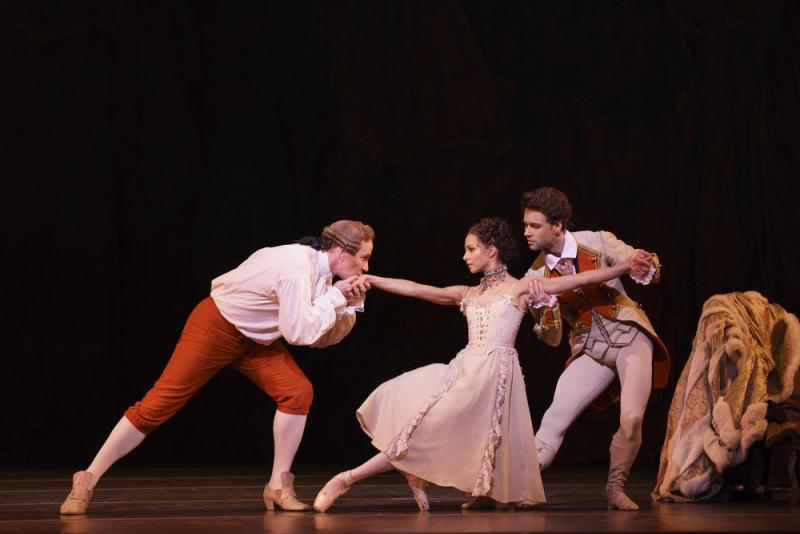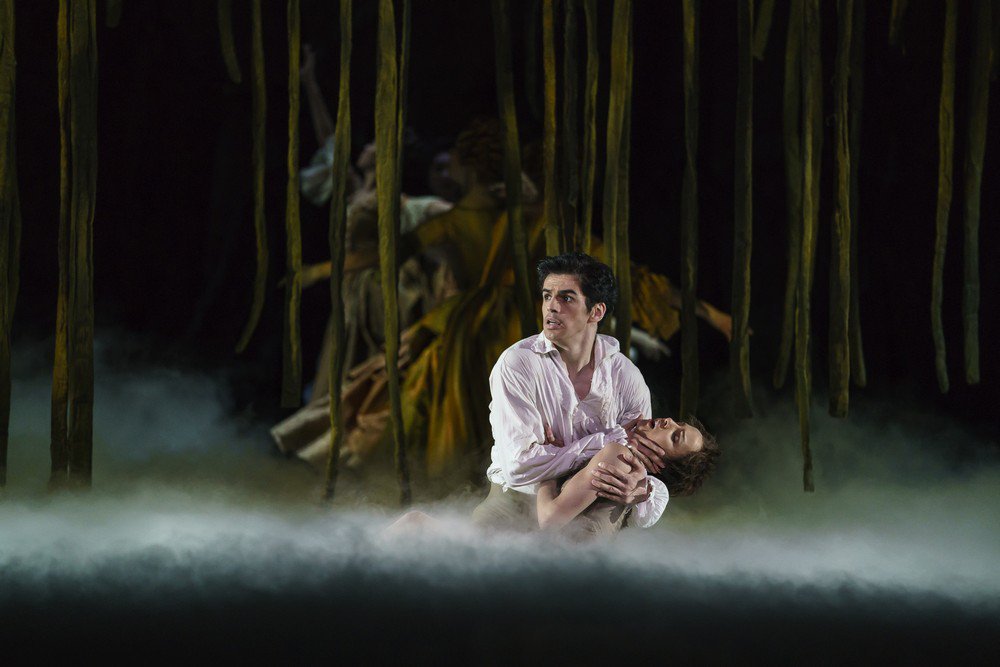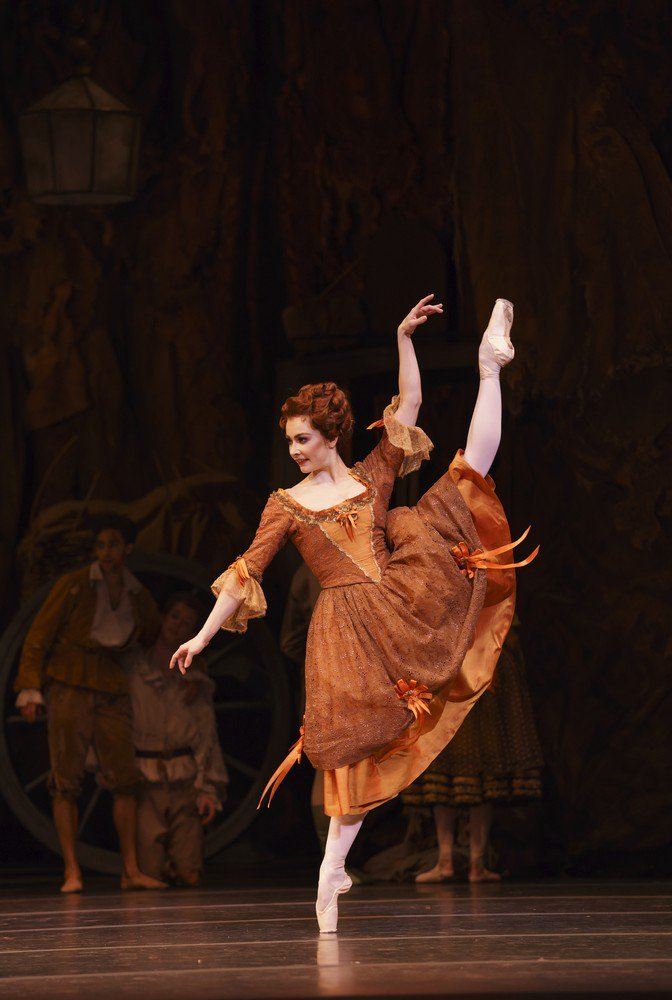Manon, Royal Ballet review - glitter and betray | reviews, news & interviews
Manon, Royal Ballet review - glitter and betray
Manon, Royal Ballet review - glitter and betray
Francesca Hayward makes a virtue of a pleasure-loving enigma in pacy MacMillan revival

"Massenet feels it as a Frenchman, with powder and minuets," declared Puccini in annoucing his own operatic setting of the Abbé Prévost's 1731 novel Manon Lescaut.
Light and seemingly invertebrate, this Manon somehow manages to keep to herself even when she's mishandled in two of the three least conventional numbers, musically and dramatically, in the ballet – first in a Pas de trois with her pimping brother (Alexander Campbell, chameleonic) and the Monsieur to whom she's sold (Christopher Saunders), then by a whole cohort of rich patrons in a rather peculiar brothel. Peculiar because it's supposed to be a posh establishment run by the ever-classy Elizabeth McGorian, yet it's populated by the slutty, play-it-for-laughs mopheads left over from the 16th century setting of MacMillan's Romeo and Juliet. Is there just too much voyeuristic "fun" here for the #MeToo era?  Hayward saves us from all that, explicitly so when she's at last forced to react to Gary Avis's Louisiana gaoler, a MacMillan invention with a typically stylised rape scene set to some of the most inappropriately pretty music in the score, and when at death's door in the swamp with her loyal Des Grieux (Federico Bonelli and Hayward pictured above) in the final scene to overblown tosh from Massenet's La Vierge. Delicacy was his thing, not second-rate Tchaikovsky passion, and much of the former has gone in Yates' decision to revise the original Leighton Lucas selection, "reworking," as he puts it, "the dramatic structure (volume)". All this might have been obviated if the job had gone to the master of the potpourri ballet, John Lanchbery.
Hayward saves us from all that, explicitly so when she's at last forced to react to Gary Avis's Louisiana gaoler, a MacMillan invention with a typically stylised rape scene set to some of the most inappropriately pretty music in the score, and when at death's door in the swamp with her loyal Des Grieux (Federico Bonelli and Hayward pictured above) in the final scene to overblown tosh from Massenet's La Vierge. Delicacy was his thing, not second-rate Tchaikovsky passion, and much of the former has gone in Yates' decision to revise the original Leighton Lucas selection, "reworking," as he puts it, "the dramatic structure (volume)". All this might have been obviated if the job had gone to the master of the potpourri ballet, John Lanchbery.
The development of Manon's relationship with Des Grieux is oddly charted: you'd expect youthful romance in the first scene at an inn near Paris, but again the music is doomy (Massenet's Elégie) and Federico Bonelli's Des Grieux, though a handsome presence, doesn't convey much except peacock strutting. Maybe that's a flaw in the "support" choreography, but the "desperate passion" is absent from his interpretation until the very end.
 Still, the opening moves with MacMillan's usual energy, filled by every role in this confident revival and much helped by vivacious playing from the pit under Yates (the wind solos in Act 1 a little better than the solo strings later on). The three main Pas de deux come in the second scenes of each act – the first two teasingly sensuous, the last unmoving despite some breathtaking mid-air flips from Hayward.
Still, the opening moves with MacMillan's usual energy, filled by every role in this confident revival and much helped by vivacious playing from the pit under Yates (the wind solos in Act 1 a little better than the solo strings later on). The three main Pas de deux come in the second scenes of each act – the first two teasingly sensuous, the last unmoving despite some breathtaking mid-air flips from Hayward.
There's good definition from Claire Calvert (pictured right). who manages to remain classy in the deliberately awkward duet with a drunken Lescaut, and the hôtel particulier is more pleasing to the eye than the other public settings; Nicholas Georgiadis' mesh of rags and finery doesn't look so good these days. despite the trademark russets (against which Manon in a besilvered black dress looks very strange in Act II). Still, if you want a sense of period, you'll have to come to the ballet rather than either of the Royal Opera's current operatic Manons (Laurent Pelly's Massenet set in the 19th century, Jonathan Kent's Puccini clunkily contemporary). I'm glad to have seen it, but in future I'll stick to the greater inscaping of the operas. Nevertheless, overall a four-star performance of a three-star work.
- Manon at the Royal Opera House until 16 May. Live cinema relay on 3 May
- More dance reviews on The Arts Desk
rating
Explore topics
Share this article
Add comment
The future of Arts Journalism
You can stop theartsdesk.com closing!
We urgently need financing to survive. Our fundraising drive has thus far raised £49,000 but we need to reach £100,000 or we will be forced to close. Please contribute here: https://gofund.me/c3f6033d
And if you can forward this information to anyone who might assist, we’d be grateful.

Subscribe to theartsdesk.com
Thank you for continuing to read our work on theartsdesk.com. For unlimited access to every article in its entirety, including our archive of more than 15,000 pieces, we're asking for £5 per month or £40 per year. We feel it's a very good deal, and hope you do too.
To take a subscription now simply click here.
And if you're looking for that extra gift for a friend or family member, why not treat them to a theartsdesk.com gift subscription?
more Dance
 'We are bowled over!' Thank you for your messages of love and support
Much-appreciated words of commendation from readers and the cultural community
'We are bowled over!' Thank you for your messages of love and support
Much-appreciated words of commendation from readers and the cultural community
 R:Evolution, English National Ballet, Sadler's Wells review - a vibrant survey of ballet in four acts
ENB set the bar high with this mixed bill, but they meet its challenges thrillingly
R:Evolution, English National Ballet, Sadler's Wells review - a vibrant survey of ballet in four acts
ENB set the bar high with this mixed bill, but they meet its challenges thrillingly
 Like Water for Chocolate, Royal Ballet review - splendid dancing and sets, but there's too much plot
Christopher Wheeldon's version looks great but is too muddling to connect with fully
Like Water for Chocolate, Royal Ballet review - splendid dancing and sets, but there's too much plot
Christopher Wheeldon's version looks great but is too muddling to connect with fully
 iD-Reloaded, Cirque Éloize, Marlowe Theatre, Canterbury review - attitude, energy and invention
A riotous blend of urban dance music, hip hop and contemporary circus
iD-Reloaded, Cirque Éloize, Marlowe Theatre, Canterbury review - attitude, energy and invention
A riotous blend of urban dance music, hip hop and contemporary circus
 How to be a Dancer in 72,000 Easy Lessons, Teaċ Daṁsa review - a riveting account of a life in dance
Michael Keegan-Dolan's unique hybrid of physical theatre and comic monologue
How to be a Dancer in 72,000 Easy Lessons, Teaċ Daṁsa review - a riveting account of a life in dance
Michael Keegan-Dolan's unique hybrid of physical theatre and comic monologue
 A Single Man, Linbury Theatre review - an anatomy of melancholy, with breaks in the clouds
Ed Watson and Jonathan Goddard are extraordinary in Jonathan Watkins' dance theatre adaptation of Isherwood's novel
A Single Man, Linbury Theatre review - an anatomy of melancholy, with breaks in the clouds
Ed Watson and Jonathan Goddard are extraordinary in Jonathan Watkins' dance theatre adaptation of Isherwood's novel
 Peaky Blinders: The Redemption of Thomas Shelby, Rambert, Sadler's Wells review - exciting dancing, if you can see it
Six TV series reduced to 100 minutes' dance time doesn't quite compute
Peaky Blinders: The Redemption of Thomas Shelby, Rambert, Sadler's Wells review - exciting dancing, if you can see it
Six TV series reduced to 100 minutes' dance time doesn't quite compute
 Giselle, National Ballet of Japan review - return of a classic, refreshed and impeccably danced
First visit by Miyako Yoshida's company leaves you wanting more
Giselle, National Ballet of Japan review - return of a classic, refreshed and impeccably danced
First visit by Miyako Yoshida's company leaves you wanting more
 Quadrophenia, Sadler's Wells review - missed opportunity to give new stage life to a Who classic
The brilliant cast need a tighter score and a stronger narrative
Quadrophenia, Sadler's Wells review - missed opportunity to give new stage life to a Who classic
The brilliant cast need a tighter score and a stronger narrative
 The Midnight Bell, Sadler's Wells review - a first reprise for one of Matthew Bourne's most compelling shows to date
The after-hours lives of the sad and lonely are drawn with compassion, originality and skill
The Midnight Bell, Sadler's Wells review - a first reprise for one of Matthew Bourne's most compelling shows to date
The after-hours lives of the sad and lonely are drawn with compassion, originality and skill
 Ballet to Broadway: Wheeldon Works, Royal Ballet review - the impressive range and reach of Christopher Wheeldon's craft
The title says it: as dancemaker, as creative magnet, the man clearly works his socks off
Ballet to Broadway: Wheeldon Works, Royal Ballet review - the impressive range and reach of Christopher Wheeldon's craft
The title says it: as dancemaker, as creative magnet, the man clearly works his socks off
 The Forsythe Programme, English National Ballet review - brains, beauty and bravura
Once again the veteran choreographer and maverick William Forsythe raises ENB's game
The Forsythe Programme, English National Ballet review - brains, beauty and bravura
Once again the veteran choreographer and maverick William Forsythe raises ENB's game

Comments
A little bit churlish in some
Always happy to know which
Always happy to know which references weren't clear, Richard, and to simplify/qualify if necessary.
in a rather peculiar brothel.
Perhaps just tweak and
Perhaps just tweak and recostume/recoiffure the mopheads. The music is all good, which can't be said for the later scenes.
"I'm glad to have seen it,